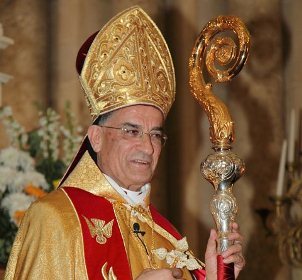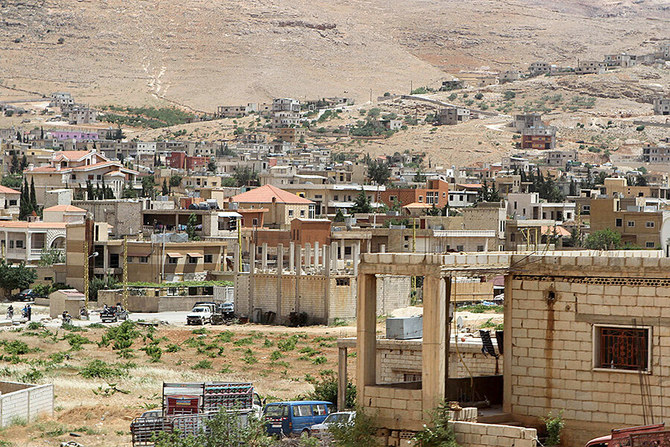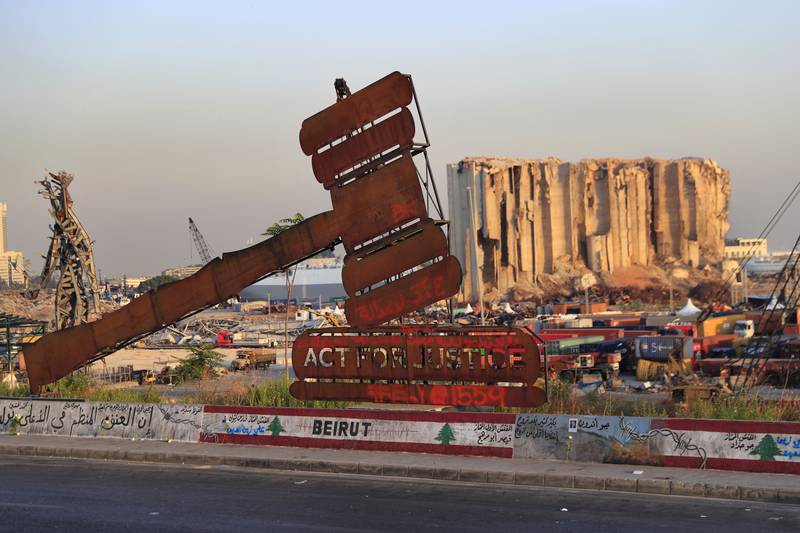
By Doreen Abi Raad • Catholic News Service • BEIRUT (CNS) — The 2020 Beirut port blast was the “crime of the century,” said Lebanese Cardinal Bechara Rai, Maronite patriarch. In a solemn Mass commemorating the second anniversary of the blast Aug. 4, the cardinal expressed frustration that no one had been held accountable for the explosion that left 224 dead, 7,000 injured — including 150 of whom are now disabled — and 300,000 homeless. Investigations regarding the blast have been paralyzed by legal and political wrangling. “We are today in the presence of two crimes, that of the explosion of the port and that of the paralysis of the investigation. This paralysis is no less scandalous than the explosion itself,” Cardinal Rai said in his homily at St. George Maronite Cathedral, one of some 70,000 buildings that suffered damages from the blast.
The Mass was attended by family members of the blast victims, the injured and those whose homes and livelihoods had been destroyed. Many family members, dressed in black, held photos of their deceased loved ones. One of the biggest non-nuclear explosions ever, the blast was caused by the detonation of a stockpile of ammonium nitrate improperly stored at the port for years. It was so powerful that buildings were affected more than 12 miles away, and the tremor was felt on the island of Cyprus, 165 miles across the Mediterranean Sea. “We raise a voice of anger against all officials, whoever they may be, wherever they may be and no matter their status, who are obstructing the investigation as if it were a trivial accident,” Cardinal Rai said. He noted that church officials repeatedly had “called for an international investigation … as the crime may be a crime against humanity in the event that it is found to be a premeditated act.” “The state does not have the right, on the one hand, to refuse an international investigation, and on the other, to block the national investigation,” Cardinal Rai said. “History will not forget all those who sought to erase the truth of the crime of the century and the right of the people to justice,” the cardinal said. “God will condemn those responsible.” “With this memorial service, we wish to add our voice to that of the families of the victims and martyrs, to the voice of the wounded and disabled, and to the voice of those affected,” he said.

by cpj.org --- On the evening of Wednesday, August 3, a group of men in the village of Beit Yahoun, in southern Lebanon, attacked Shaaban while he was walking his dog and threatened to kill him, according to multiple news reports, a statement by a local press freedom group, and the journalist, who spoke to CPJ in a phone interview. On Thursday morning, Shaaban found a bullet left on the window of his car, images of which he posted to Facebook; he told CPJ he saw it as a threat against his life. Shaaban works as a freelance photographer, and has contributed to the U.S. outlet Bloomberg as well as the regional outlets The Daily Star, Middle East Eye, Lorient Today, and Al-Modon, he told CPJ. He recently covered protests over water shortages in Beit Yahoun, and said he was sure that the attack and threats stemmed from that reporting. “The attack on Lebanese photojournalist Hasan Shaaban and the threats to his life are deeply alarming, and authorities should investigate them at once,” said CPJ’s Middle East and North Africa program coordinator, Sherif Mansour, in Washington D.C. “Authorities should ensure that those responsible do not escape justice, and must protect Shaaban and all other journalists covering protests and other sensitive issues throughout the country.”
On Wednesday evening, a man approached Shaaban and told him and his dog to leave Beit Yahoun, the journalist told CPJ. After the journalist refused, that man returned with seven other men, and one slapped Shaaban in the face, another punched him, and as the journalist fled the scene, the men followed him, knocked him to the ground, and beat, punched, and kicked him, Shaaban told CPJ. The attack stopped when one of the men said, “that’s enough,” and one of the attackers told Shaaban, “If we ever see you back here, we’ll kill you.” Shaaban told CPJ that, while the men did not say why they were attacking him, he believed it was retaliation for photos and videos of those protests he published on his personal Facebook page, where he has about 1,700 followers and frequently posts his reporting. Those posts, which included clips of locals criticizing the local political parties Amal and Hezbollah, were later cited in local media reports, he said. He told CPJ that he knew the men who attacked him, and they were supporters of Hezbollah. “If there was another reason, they would’ve done it before,” he said. “This is clearly because the reporting went viral.”
by diplomatie.gouv.fr — Two years after the Beirut port explosion on August 4, 2020, France expresses its total solidarity with the Lebanese …

by NADIA AL-FAOUR -- arabnews -- DUBAI: Two years ago, on Aug. 4, 2020, Ghassan Hasrouty walked into his office at the port of Beirut where he had worked a steady job for the past 38 years. He would not return home that day. At 6:07 p.m. local time, hundreds of tons of hazardously stored ammonium nitrate ignited in Warehouse 12 where Hasrouty was working. He and several of his colleagues were killed instantly. The third biggest non-nuclear explosion ever recorded in history devastated the port and a whole district of the Lebanese capital. At least 220 people were killed, more than 7,000 wounded, and a city already in the throes of economic and political crisis was left paralyzed under a mushroom cloud of pink smoke. “The investigation of the port explosion will be transparent. Take five days, and any officials involved will be held accountable,” Mohammed Fahmi, Lebanon’s interior minister at the time, said after the blast. And yet, two years on, as families still reel from the loss of their homes, businesses and loved ones, the official Lebanese state’s investigation remains stagnant.
On July 31, part of the port’s now grimly iconic grain silos collapsed, sending a cloud of dust over the capital, reviving traumatic memories of the blast. The Lebanese Cabinet recently approved plans for the controlled demolition of the silos, which were badly damaged but miraculously survived the 2020 blast, having sustained much of its force. The decision has sparked outrage among Beirut residents and victims’ support groups who have called for the silos to be preserved until a full and proper investigation into the blast is concluded. Many place the blame for the blast and its aftermath on corruption and mismanagement within the Lebanese government. With a status quo originating from the days of the 1975 to 1990 civil war, which has rendered those in power effectively untouchable, the inquiry has descended into little more than a finger-pointing match as it moves from one presiding judge to the next. With that, politicians have effectively ensured the complete impunity of officials who have long been wanted for questioning, arrest and prosecution.
Khazen History


Historical Feature:
Churches and Monasteries of the Khazen family

St. Anthony of Padua Church in Ballouneh
Mar Abda Church in Bakaatit Kanaan
Saint Michael Church in Bkaatouta
Saint Therese Church in Qolayaat
Saint Simeon Stylites (مار سمعان العامودي) Church In Ajaltoun
Virgin Mary Church (سيدة المعونات) in Sheilé
Assumption of Mary Church in Ballouneh
1 - The sword of the Maronite Prince
2 - LES KHAZEN CONSULS DE FRANCE
3 - LES MARONITES & LES KHAZEN
4 - LES MAAN & LES KHAZEN
5 - ORIGINE DE LA FAMILLE
Population Movements to Keserwan - The Khazens and The Maans
ما جاء عن الثورة في المقاطعة الكسروانية
ثورة أهالي كسروان على المشايخ الخوازنة وأسبابها
Origins of the "Prince of Maronite" Title
Growing diversity: the Khazin sheiks and the clergy in the first decades of the 18th century
Historical Members:
Barbar Beik El Khazen [English]
Patriach Toubia Kaiss El Khazen(Biography & Life Part1 Part2) (Arabic)
Patriach Youssef Dargham El Khazen (Cont'd)
Cheikh Bishara Jafal El Khazen
Patriarch Youssef Raji El Khazen
The Martyrs Cheikh Philippe & Cheikh Farid El Khazen
Cheikh Nawfal El Khazen (Consul De France)
Cheikh Hossun El Khazen (Consul De France)
Cheikh Abou-Nawfal El Khazen (Consul De France)
Cheikh Francis Abee Nader & his son Yousef
Cheikh Abou-Kanso El Khazen (Consul De France)
Cheikh Abou Nader El Khazen
Cheikh Chafic El Khazen
Cheikh Keserwan El Khazen
Cheikh Serhal El Khazen [English]
Cheikh Rafiq El Khazen [English]
Cheikh Hanna El Khazen
Cheikha Arzi El Khazen
Marie El Khazen